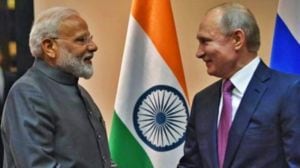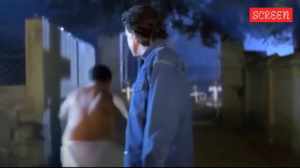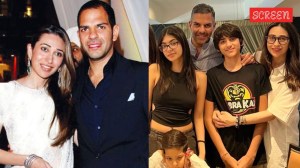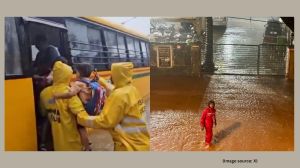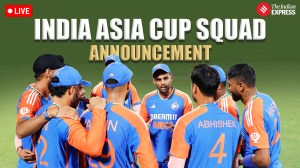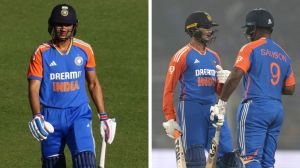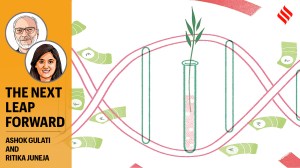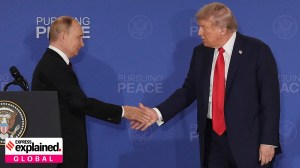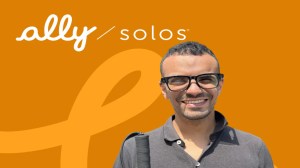Click here to follow Screen Digital on YouTube and stay updated with the latest from the world of cinema.
Shakun Batra on going the AI way: ‘I’d love to marry Artificial Intelligence with flesh and blood, but actors are rarely available within budget today’
In an exclusive interview with SCREEN, director Shakun Batra talks about making a five-part short film series using Artificial Intelligence, the Raanjhanaa ending controversy, and whether he'll get replace actors with AI going forward.
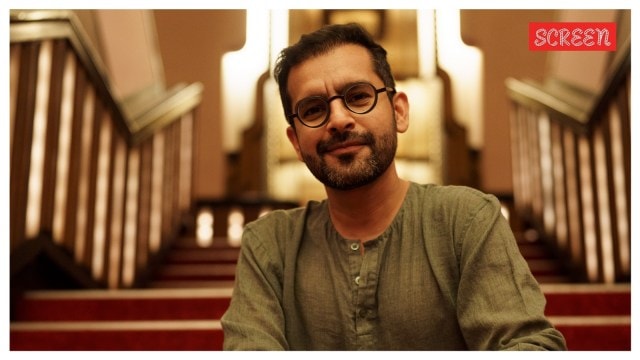 Shakun Batra talks to SCREEN about his experiments with Artificial Intelligence.
Shakun Batra talks to SCREEN about his experiments with Artificial Intelligence.What if Artificial Intelligence is employed to change the ending of Shakun Batra’s 2012 directorial debut, Ek Main Aur Ekk Tu? Kareena Kapoor finally falls for Imran Khan, happy ending enough? Or Rajat Kapoor isn’t run over by a truck in Kapoor & Sons (2016)? Or maybe Deepika Padukone just brings Siddhant Chaturvedi back to life in Gehraiyaan (2022)?
Shakun is aware in light of the recent Raanjhanaa controversy that AI can be used by studios to alter any of the existing creative works, but he’s hopeful that’s just an aberration. He’s created a five-part short film series, Imagine with Shakun Batra X Google Gemini, using Veo 3, Google’s advanced AI video generation model. The first short, The Getaway Car, already out, is a stylish car chase sequence.
Five years ago, I wouldn’t have imagined a car-chase film coming from Shakun Batra. Would you have ventured into this genre if it weren’t for your experimentation with AI?
I wouldn’t have thought about it even two years ago! It’s really funny why I even tried a car chase in the first place. I had a script which had a couple of small stunt pieces. And I could see apprehension in people. The biggest stunt I’ve had in any of my films is a slap. So I thought, if I have the tools or resources, what would I do? Around the time, AI had just started to make the shift when you could try things out in video. That’s when I came across Google Veo 3 and started to play more. I was surprised at how quickly I got the hang of it, and it’s been a wonderful journey ever since.
Do you believe AI can only be used to achieve scale, and not to create intimacy?
I started seriously toying with it last November. I didn’t know then that by August, I’d have a full car chase film with high production value. I thought we were a while away; that dialogues and lip-sync would take a while. But that happened very fast. Last year, when I was talking about AI, a few friends were dismissive of it. But I’ve seen its usage. In February, I was shooting for a commercial where I used AI, and the client used the AI shot instead of the shot I created on set. I have seen the shift. I’m sure somebody would be able to achieve intimacy through AI tools.
Do you think AI is more useful in ad films, instead of features where there’s more scrutiny?
An ad film has always been an easier place to experiment because the shots are much shorter, and you can get away with a lot. To be honest, even in the car chase, the cutting is so fast it’s hard for you to capture flaws. It wouldn’t be wrong to say I see it happening in feature films soon. One of the biggest drawbacks of AI four months ago was consistency, whether it’s faces, detailing or environment. We’ve seen a huge shift on that front. AI is going to be like VFX. When VFX came in, there was bad VFX and Chroma work. But there were filmmakers like SS Rajamouli, or even Sanjay Leela Bhansali, who took those tools and really mounted a canvas we hadn’t imagined before. So there’ll be filmmakers who’ll use AI better, and there’ll be others who’d use it in a way it discourages others. Since AI is in the early stages, we’re going to see the good, the bad, and the ugly. It’s going to be up to us to see what we want to do with it.
What’s your response to those who dismiss AI by arguing it doesn’t have childhood trauma?
Well, you still have childhood trauma, right? Look at AI as a tool. What defines an artiste isn’t the tool, but the intent. You can still use it to communicate better. A lot of filmmakers never get the opportunity to even make a short film. People who come out of film schools take years of assisting to save the money to make a short film. But now, they can make a short film even without going to a film school, using AI. There’s enough information on YouTube. I’ve learned almost all the AI tools I use through YouTube. Of course, I’ve taken a couple of online courses, but the biggest learning was doing YouTube lessons and then trying it out. So, the next generation of filmmakers isn’t going to wait 10-12 years for someone to give them funding. They’ll move to this straight away.
What would you suggest budding filmmakers to learn along with getting equipped with AI?
AI only echoes your taste. If you don’t have a personal taste, AI is going to give you only generic stuff. Very soon, I see the ecosystem get filled with a lot of generic stuff. Content creation is far easier today than it was 15 years ago, whether on Instagram or YouTube. The only people who’ll really shoot through are those with actual tastes, thoughts, philosophy, and beliefs that they want to communicate via AI. It’s only going to ease and accentuate your journey, but it’s not going to say something you don’t have. Everyone’s using AI to sound smarter. But if you don’t have your own thoughts, at some point, it’d just plateau.
Aamir Khan has already skipped all OTT platforms to release his new film Sitaare Zameen Par on YouTube on a pay per view basis. Do you think YouTube is going to be the next big leveller for filmmakers?
YouTube is already a leveller in many ways. We’ve never seen so many content creators become millionaires. They’d have found it very hard if they had to go through the traditional channels of TV and films. Mr Beast is a billionaire, and Tom Cruise isn’t. It tells you YouTube is already there. There’ll be more changes to how exhibition works. Because of the democratization, and capital not being a leverage, a lot of creators will want to go straight to the audience, with something that looks huge. Let’s talk about what music went through 15 years ago. You no longer needed a big studio, an orchestra, and recording with multiple artistes. You could, like most artistes today, sit in a room with a laptop and a musical instrument and start building from there. Now, you’re going to have five or six people sit together and create a film that looks massive. It’s only a matter of time before we see that.
Speaking of Tom Cruise, he’s the gold standard of car chases. Do you think AI can ever achieve that pulsating energy or we’ll have to still rely on flesh and blood?
I don’t think AI means there can’t be any flesh and blood. The best future would be when the two skill sets merge. I don’t think anyone can replace Tom Cruise or Shah Rukh Khan, for that matter. The connect they have is so strong I don’t think they’ll be replaced anytime soon. I don’t encourage AI as a replacement to the human endeavour of expression, but it can help you to get there faster without depending on funds.
Why do you think then Hollywood has imposed safeguards against the use of AI to recreate an actor’s image or voice, or for screenwriters to not be forced to develop AI-generated scripts?
We’ll have to go into the same territory very soon. Ethics, ownership, and authorship are very important conversations with AI. Just because I’m stepping into the world of AI doesn’t mean I don’t see the challenges. A lot of models are trained on data that we don’t know whose responsible for. But we shouldn’t stop the learning phase. Those answers should be figured out simultaneously. There’ll have to be government and legal authorities which will have to put guardrails. There’s a fine line, and we should collectively talk about it so that we’ll have the answers sooner or later.
When I broke the story of the Raanjhanaa ending being changed using AI without the director, writer or actors’ consent, Eros argued that they’re doing that because they want to support innovation. But in this case, is it really about innovation?
Over the years, there’s been a certain hierarchy in the studio system. But creators have gotten more aware. Even SWA (Screenwriters Association) has come into play, contracts have become more important. Twenty years ago, they were very weak. Consent will play a big role now. The need of the hour is for people at the top to not think of just today or a year from now, but of the next 100 years. How we make movies is about to change, just like music did.
On a lighter note, not that he would, but what if Karan Johar decides to change the ending of your films?
Maybe, I’ll only change it (laughs). I don’t think I need to revisit what I’ve done. I’d rather explore what’s on my mind today and invest my energy there. A film reflects the person I was at a point in my life. I don’t think it’s my job to constantly go back and correct myself. If someone else changes it, it would hurt anyone who put in their soul and a lot of time into it. But these things are helping us start a conversation. As hard as it is, it’s an eye-opener.
Speaking of Karan, he said when his directorial Rocky Aur Rani Kii Prem Kahaani released in 2023, that you shared your disillusionment with him that there was no space for your kind of movie, since the theatrical landscape then was saturated by action spectacles. Do you think AI can be used to bridge that gap between your conviction and the market trend?
AI will definitely de-risk any effort or idea. For example, the car chase is like a prototype I did just to have fun. But the intent is still going to matter. Do you want to use AI to follow a trend or finally show people what you want to express? There’ll be a bunch of players who’ll use to cash in on the trend, and they may be successful too. But there’ll also be genuine creators who will have tools to create something out of their imagination that’s not even a part of the zeitgeist right now. Those are the filmmakers I’d like to hopefully find, mentor, and push going forward, those with a unique voice as well as an understanding of the tool.
Kayoze Irani was an Assistant Director on your directorial debut. It’s taken him 13 years to release his directorial debut feature, Sarzameen. Do you believe it’s more difficult for young filmmakers to break through now?
Even though there are more opportunities with OTT now, I think it’s gotten a little harder to get a film. I was 28 when I shot my first film in Las Vegas. At that time, a lot of debut filmmakers were able to shoot overseas because the industry was in a healthier place and the returns were higher. It has gotten much harder for a first-time filmmaker to get that kind of a budget. The competition is much tougher and the budgets much tighter. Studios are becoming risk-averse, and the predictability is killing creativity. That’s why I took refuge in AI because I needed to exercise a creative part of me which wasn’t getting accessed. Filmmaking is an expensive creative outlet. With AI, it’s been a lot of fun to try out new things at a much lower cost.
Can we then expect your next feature to be AI-generated as well?
I still love traditional filmmaking. It’s funny I call it that but given the AI ecosystem, I think it’s going to become a part of everyone’s vocabulary. I still enjoy being with an actor, a cameraperson, and a crew on set. I’ll start shooting Lust Stories 3 next month, and then there’s a feature we’re pitching. But actors are rarely available. Their dates are so far out. So I have time to experiment more. I do see a future, hopefully not too far, where I can marry the two. I’m going to create a cinematic world using AI and bring actors into it. You’d no longer need 100 days to shoot. You’d just need 15-20 days to shoot with the actors and build everything else on AI, and you’ll still have a film that looks big.
Given that you’re now venturing into a genre that you otherwise wouldn’t, have you tasted blood with AI?
AI has unlocked a part of me that I’m interested to explore. But, I’ll tell you what part of me will never go away — going into a room with just a few actors and creating something that’s alive. Even in the car chase sequence, I did just two days on the performance shots because I wanted the reaction to be in sync with what’s happening and graph it a particular way. I was telling myself this would be so much easier with actors. Working with actors is still the most fun part, it’s just that the actors aren’t available for the budget you have for the film. Please understand that I’ve built my career of 15 years a certain way. So, it’s not that I can leave all that and start thinking about everything else. I still love how I’ve managed to make films so far. It’ll change, but I don’t want to completely let go either. Hopefully, there’ll be a good balance.


Photos
Photos
- 01
- 02
- 03
- 04
- 05













